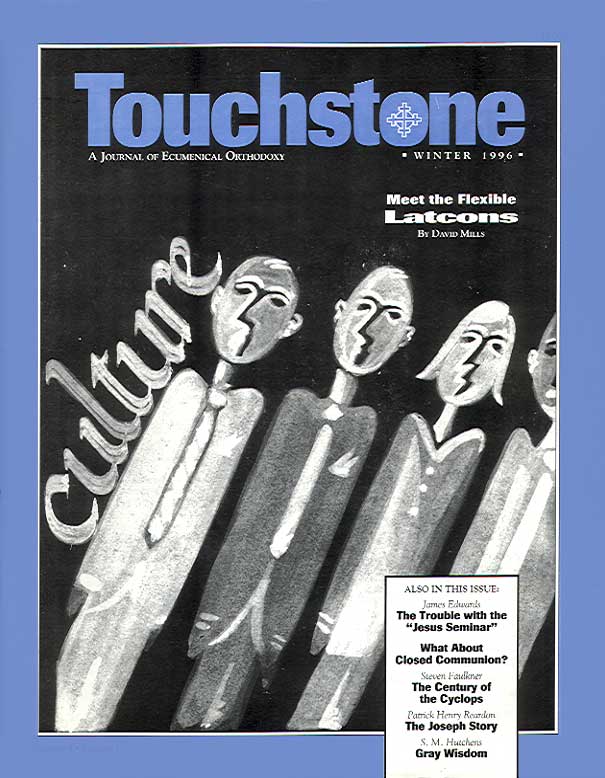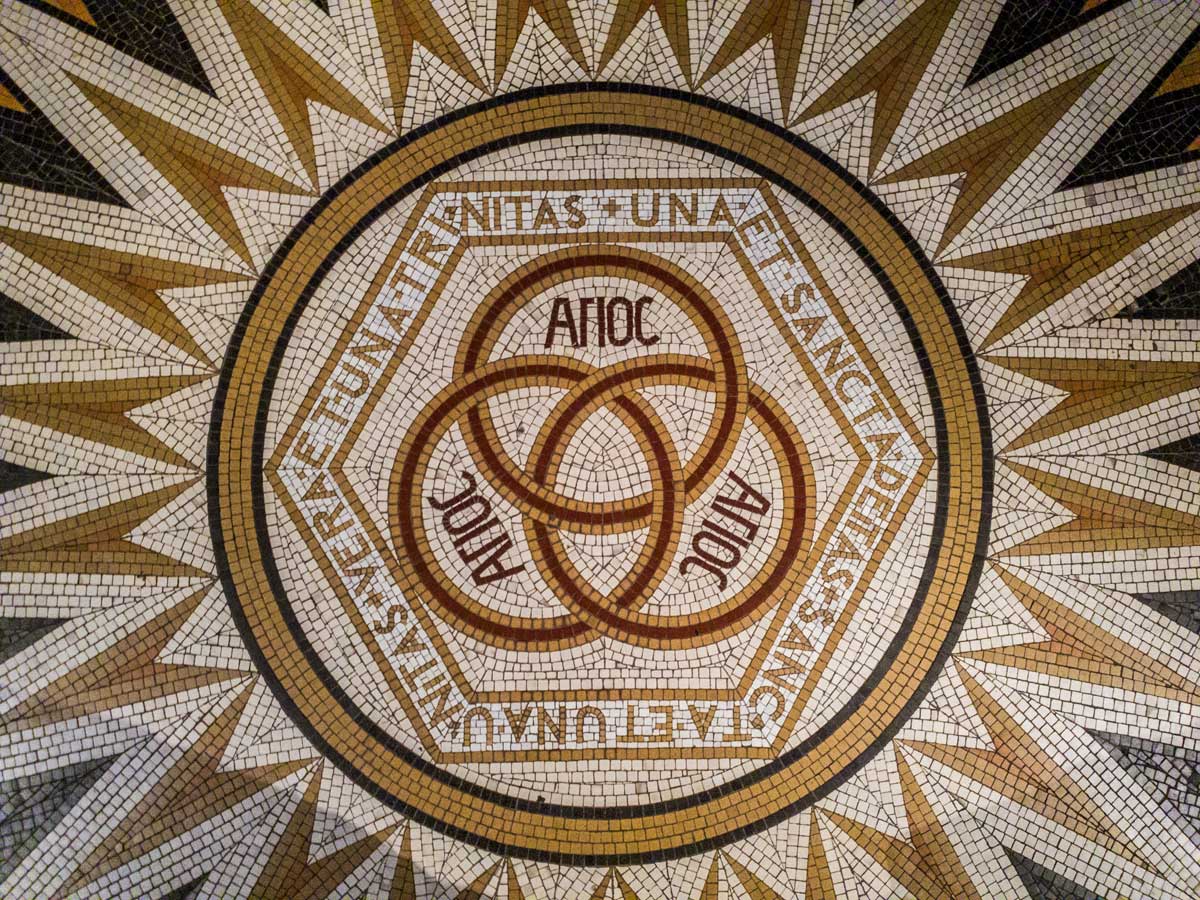Never the Twain?
The September 1995 issue of This Rock, a conservative Roman Catholic publication of a rather apologetic bent, featured an editorial called “What Happened to Franky Schaeffer?” which took considerable umbrage at last fall’s edition of Schaeffer’s The Christian Activist. Understandably so, inasmuch as the latter contained some rather rough comments about the Roman Catholic Church, especially in a long piece by the Orthodox priest, Alexey Young. In fact, Father Alexey’s article was excerpted from his recent book that ardently urges the Orthodox not to pursue union with the Roman papacy.
Carefully setting that theological question aside, I here take issue with This Rock’s editorial on only one point, and this a matter of speculation. It notes, correctly, that the views of Schaeffer and Young are at odds with the thinking of certain Orthodox hierarchs, especially the ecumenical patriarch (of Constantinople). When it goes on to speculate, however, relative to Patriarch Bartholomew and Orthodox Christians, that “most of them are on the trail he is blazing” toward Rome, this is saying far more than can safely be said. The statement does, however, merit more comment.
Frustrated Ecumenical Hopes
Conservative Roman Catholics seem to feel close to the Orthodox Church in ways that they do not necessarily feel close to Protestants. They sympathetically recognize that Roman Catholicism and Orthodoxy have much in common with respect to structure (bishops, dioceses, etc.), piety (devotion to the Mother of God, monasticism, etc.), morality (opposition to abortion, etc.), authority (Tradition, Councils, etc.) and myriad other particulars. Conservative Roman Catholics also read good Orthodox writers like Thomas Hopko, Stanley Harakas, Anthony Ugolnik and so forth, and they usually like what they find there. So they wonder why the two groups don’t just get together and put better than three-quarters of all Christians under one (papal, naturally) roof, perhaps thereby causing Protestantism at last to see the light, get with the program and come aboard.
Father Richard John Neuhaus eloquently spoke for this Roman Catholic assessment at the Rose Hill Conference in South Carolina last May, when he declared that the only thing really separating the two groups was the bare act of removing the separation. Then, in a moving Protestant response to this suggestion, S. M. Hutchens addressed the Orthodox and Roman Catholics: “If you two grand ladies can figure out which of you is the real Mrs. Jesus, then perhaps the rest of us can come on home.”
More realistic than most men, Hutchens expressed doubts that this is likely to happen except in an apocalyptic setting, including apocalyptic-scale martyrdom. Some of us present, however, were deeply impressed by, nor will ever forget, the fervent sentiments of Christian charity proclaimed by Neuhaus and Hutchens. We wanted to sit down right there and then, send for the pope, the Eastern Patriarchs, the Archbishop of Canterbury and the appropriate Protestant leaders, instruct them to knock off the foot-dragging, fill out the necessary forms, share the Eucharist, exchange the Kiss of Peace, and thus resolutely make schism a thing of the past. Our hearts truly wept with the longing to do it.
Conservative Roman Catholics, looking sympathetically at the Orthodox, seem to feel that a great deal of the foregoing hopes might be soon fulfilled, perhaps even in our generation. They share Pope John Paul’s grand vision of a Christendom reunited for the third millennium. It is natural, I suppose, that they should imagine that the Orthodox partake of these hopes.
But then something terrible happens. They stumble across the latest Christian Activist, for example, or Epiphany, or Again, or maybe even a diocesan magazine like The Word. They will not read many issues of such journals without running across some severe (and, I am sorry to say, not always just nor invariably accurate) criticisms of either the Roman Catholic Church in general or the Vatican in particular. They are shocked.
Like the recent editorial in This Rock, these conservative Roman Catholics may want to dismiss such negative commentary as atypical, radical, and aberrant. They cannot bring themselves to believe that those nice Eastern Orthodox Christians do not feel so close to Rome as Rome does to them. Surely the Orthodox as a whole are more kindly disposed, they imagine; people like Frank Schaeffer and Father Alexey Young must be fanatics of some sort, not genuinely representative of the Orthodox attitude toward reunion with Rome.
The Sources of Frustration
In the interest of bringing a little realism into this perspective, the foregoing considerations prompt me to make two points, the first canonical and the second sociological.
First, the ecumenical patriarch is not an Eastern pope. When Roman Catholics disagree with their Holy Father, they are called “dissenters” and are said to be out of step. In Orthodoxy, however, it may well be the ecumenical patriarch who is out of step. Orthodox Christians feel not the slightest obligation to follow either his cadence or his direction.
Patriarch Bartholomew is an admirable man, even something of a visionary, perhaps, but he cannot speak for the Orthodox Church in anything like the same way that Pope John Paul II speaks for the Roman Catholic Church. His canonical jurisdiction within Orthodoxy is relatively slight. The nature of his office obliges him to lead by moral rather than canonical force, and his moral force is determined largely by what Orthodox Christians in general perceive to be his moral stature. The latter, I am happy to say, appears to be immense at the moment.
But Roman Catholics should make no mistake about the ecumenical patriarch’s ability to “deal” with the Vatican on this matter of Christian reunion. The pope can sign an agreement for all of Roman Catholicism, but no one can do such a thing for Orthodoxy and necessarily make it stick. If Orthodox Christians worldwide ever believed, or even gravely suspected, that the doctrine and life of the Orthodox Church were being compromised by the ecumenical patriarch’s relations with Rome, they would utterly cut him off from the Church. It would be done by priests in Romania and Serbia, laymen in Greece and Bulgaria, monks on Mount Sinai and Mount Athos, babushkas in Russia and sittus in Syria, my own parishioners in Pennsylvania, and eventually even by the Orthodox bishops themselves. That is how Orthodoxy works, and Patriarch Bartholomew knows this better than anyone. He is a good, wise, and kindly man, burning with a godly desire for the reunion of all Christians, but he is nobody’s fool.
Second, no Orthodox Christians anywhere in the world share that view of the papacy promulgated at Vatican I and II and considered essential to Roman Catholic ecclesiology. It is understandable and truly commendable that conservative Roman Catholics should rally around Pope John Paul in these tragic times, but only a dramatic inadvertence to history could make them imagine for a moment that Eastern Orthodox Christians might share their perspective on the matter. The Orthodox Church will never adopt their view of the Roman papacy, and it is illusory to imagine otherwise. I am not crowing about this. I do not celebrate anything here. But, in charity, let us not cultivate totally unfounded ecumenical hopes.
In fact, reunion with Rome is not a popular idea among the Orthodox. This Rock’s suggestion that its Orthodox supporters form a majority is downright preposterous. Arguably the Vatican has more friends in the Southern Baptist Convention than it does in the Orthodox Church.
Roman Catholic and other ecumenists need to grasp this truth somehow, disagreeable and challenging as they will surely find it. With regard to ecumenism in general and relations with Rome in particular, the overwhelming majority of Orthodox Christians are fairly divided into two groups: the incurably bored and the fiercely opposed. The very few others are on the fringe, and those who deal with them should know that they are on the fringe. This is not necessarily a bad thing, after all. If one calls Patriarch Bartholomew a “trailblazer,” one should remember that trailblazers are usually mavericks and innovators. The “cutting edge” is always a fringe.
That folks like Frank Schaeffer and Father Alexey Young do not follow the lead of a trailblazer hardly puts them at the fringe of Orthodoxy, and This Rock was wrong so to dismiss them.
The high and ardent hopes that some ecumenists currently entertain about the reunion of Rome and Orthodoxy are unrealistic in the extreme. Lovely as the vision of reunion looks to us on our occasional ascents of Mount Nebo, no one is alive today who will enter that promised land. Without the harsh eschatological conditions of which Hutchens spoke, that Jordan will not be crossed.
—Patrick Henry Reardon
Patrick Henry Reardon is pastor emeritus of All Saints Antiochian Orthodox Church in Chicago, Illinois, and the author of numerous books, including, most recently, Out of Step with God: Orthodox Christian Reflections on the Book of Numbers (Ancient Faith Publishing, 2019).
subscription options
Order
Print/Online Subscription

Get six issues (one year) of Touchstone PLUS full online access including pdf downloads for only $39.95. That's only $3.34 per month!
Order
Online Only
Subscription

Get a one-year full-access subscription to the Touchstone online archives for only $19.95. That's only $1.66 per month!
bulk subscriptions
Order Touchstone subscriptions in bulk and save $10 per sub! Each subscription includes 6 issues of Touchstone plus full online access to touchstonemag.com—including archives, videos, and pdf downloads of recent issues for only $29.95 each! Great for churches or study groups.
Transactions will be processed on a secure server.
more from the online archives
calling all readers
Please Donate
"There are magazines worth reading but few worth saving . . . Touchstone is just such a magazine."
—Alice von Hildebrand
"Here we do not concede one square millimeter of territory to falsehood, folly, contemporary sentimentality, or fashion. We speak the truth, and let God be our judge. . . . Touchstone is the one committedly Christian conservative journal."
—Anthony Esolen, Touchstone senior editor









